The Société Démographique Francophone de Belgique (SDFB) and the Vereniging Voor Demografie (VVD) organized jointly the 4th edition of the Belgian Demography Day on Wednesday, April 26th, 2023, on the campus of the UCLouvain University (Louvain-la-Neuve, Belgium). This edition is co-organized by the DEMO Research Center (UCLouvain) and is sponsored by the PSAD school (UCLouvain) and the IACCHOS Research Center.
The organizing team was composed of researchers and PhD students from UCLouvain, KULeuven, UAntwerpen and VUB.
During the day, 30 Belgian and international researchers presented their work in the field of population studies, including topics on fertility, mortality, migration, family, ageing, and health. Pr. Karel Neels (UAntwerpen, Belgium) gave a keynote speech entitled « Demography and the Data Revolution ».
Winners of the Verhulst Price received their prize and presented their master thesis at the end of the day.
We thank the organizing universities, the DEMO Center, the VVD, the SDFB, the PSAD school and the IACCHOS research center for their collaboration and help during the day! We also thank all of the participants, coming from Belgium, Sweden and China!
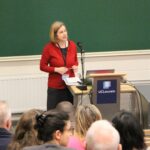
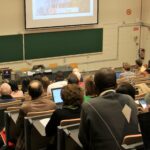
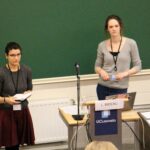
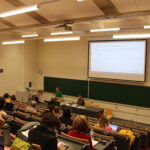
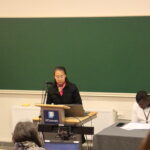
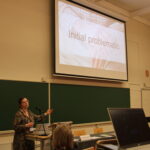
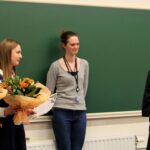
Karel Neels, professor at UAntwerpen, will give a keynote presentation entitled « Demography and the data revolution: should we shy away from the customary aggregate-level indicators? An apprisal of (alternative) fertility indicators as a case in point ».
Parallel session I
Session 1 – Families and gender (room Montesquieu 02)
- Criticism of « good balance » measures, representation, brakes, and levers in French-speaking Belgium (Laëtitia Bideau, UCLouvain);
- The Economic Consequences of Becoming a Single Father in Belgium (Luisa Fadel, UCLouvain);
- Marginalization on the partnering market across Europe (Nadia Sturm, KU Leuven);
- When is it about the money? Relative Wages and Father’s parental leave and decisions (Jonas Wood, UAntwerpen);
- Gendered trends in singlehood (Laura Robberecht, UAntwerpen).
Session 2 – Mortality: measures and inequalities (Leclercq 52)
- Social inequalities in mortality associated with neurodegeneration: a population-based study in Belgium (Janna Dinneweth, VUB);
- Premature mortality attributable to socioeconomic inequality in Belgium between 1998 and 2019 (Martina Otavova, UCLouvain);
- Estimating probabilities of decease at the municipality level (Jan Pickery, Statistics Flanders);
- Longevity Blue Zones: recent finding in Sardinia and Martinique (Michel Poulain, UCLouvain);
- Years of life lost for 137 causes of death in Belgium by age, sex, and region, 2004-2019 (Aline Scohy, Sciensano);
Parallel sessions II
Session 3 – Fertility and reproductive health: measures and determinants (room Montesquieu 02)
- Gender attitudes and fertility preferences among young men and women in 10 high fertility Sub-Saharan countries (Juliette De Vestel, VUB);
- A retrospective study on China’s Total Fertility Rate and Age-specific Rate: based on the data of the population censuses (Yanhui Zou, China Population Development Research Center);
- Analysis of Unintended Pregnancy and influencing factors among married women in China (Hui Wang, China Population Development Research Center).
Session 4 – Migration, mobility and integration (room Leclercq 52)
- Ethnic diversity and ethnic residential segregation: two decades of (co)variation and urban change in Belgium (Lena Imeraj, VUB);
- Predicting the propensity to move using public register data (Armen Abagyan, KU Leuven);
- Subsequent internal migration trajectories of asylum applicants in Belgium (Natacha Zimmer, UCLouvain).
Parallel session II
Session 5 – Ageing and health (room Montesquieu 02)
- Home and (not)Alone: How Older Adult’s Living Arrangements Affect their Experiences of Loneliness and Belonging (Haike Delafontaine, UAntwerpen);
- Children’s opportunities and constraints in long-term informal caregiving for parents: a within-family approach (Jorik Vergauwen, UAntwerpen);
- The association between breast cancer and educational level in Belgium (between 2004-2013) (Joachim Gotink, VUB);
- The effect of gender inequality on life expectancy gap in a longitudinal model, 1994-2020 (Ferenc Ajus, University of Lund).
Session 6 – The fertility of migrants and their descendants (room Leclercq 52)
- Educational expansion and fertility postponement in the 1, 5 and 2nd generations in Belgium (Leen Marynissen, UAntwerpen);
- Ethnic differentials in couple’s labour market preconditions to parenthood in Belgium (Layla Van den Berg, UAntwerpen);
- Integration VS Cultural Persistence: fertility and working time among second-generation migrants in France (Keiti Kondi, UClouvain).
Special session on health crises (room Montesquieu 02)
- How Belgium deals with annual release of population projections and demographic shocks (Marie Vandresse, Bureau fédéral du Plan);
- Comparison of Belgian Covid-19 mortality between epidemiological surveillance and death certificates for the year 2020 (Catharina Vernemmen, Sciensano);
- The Spanish Flu in Belgium (1918-19): a Socially Neutral Disease? (Isabelle Devos, History Department Gent);
- Close kin ties and COVID-19 outcomes among older adults in Europe: the role of Covid-19 precautionary behaviours (Damiano Uccheddu, UCLouvain);
- Postponement of childbearing during the Covid-pandemic (Siwen Liu, KU Leuven).
Awards ceremony & drinks (Montesquieu hallway)
